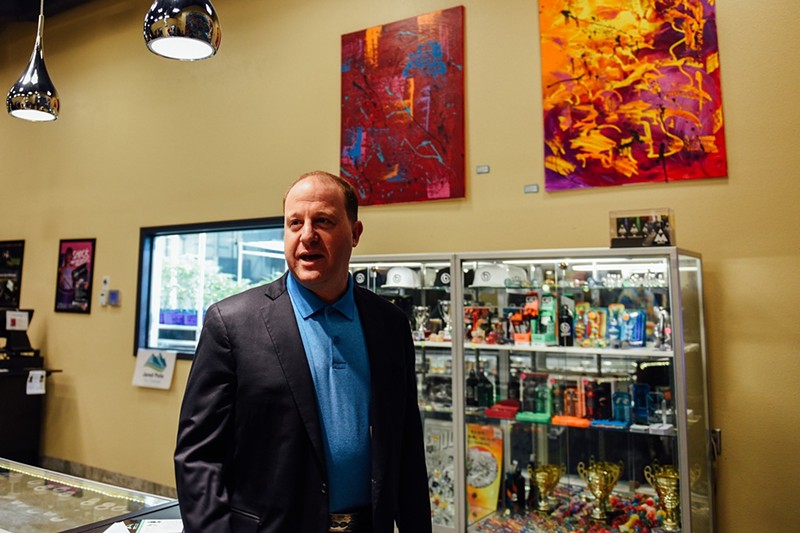Benjamin Wann and his parents, Amber and Brad, were standing next to Governor Jared Polis on May 6 as he signed a new law expanding medical marijuana access for child patients in public schools. The family had been pushing for the legislation for years and had been communicating with the governor's staff about the bill throughout the 2021 legislative session.
But when a controversial bill proposing a list of new restrictions to Colorado's medical marijuana program was introduced in the legislature eight days later, that line of communication was no longer open, according to the family. The new proposal, House Bill 1317, which quickly made its way through lawmakers to the governor's desk, negatively affects the students who were supposed to benefit from the law that the Wanns had supported, among others, they say.
"Polis didn't have a conversation with us. We reached out, and had a rally in front of his office after it passed. I don't know of anyone in the community who he had a conversation with, especially those of us who just passed that other bill," Brad says.
Part of a tight-knit Colorado community of medical marijuana patients and their families, the Wanns began supporting medical marijuana reform after discovering how a low-THC medication limited Benjamin's seizures. Now nineteen, Benjamin still suffers from a rare genetic mutation associated with epilepsy, but his parents say the seizures were reduced dramatically as his cognitive abilities improved.
"We've seen a roller-coaster effect over the years with Benjamin having seizures. People keep saying [marijuana] is so bad for the developing brain, and here's Benjamin, and we've literally seen him flourish and grow from it," Amber says.
While the Wanns sympathize with parents whose children are struggling with marijuana use, they worry that new restrictions imposed by HB 1317 will harm medical marijuana patients like Benjamin, and others whose conditions are even more severe.
"He doesn't have a wheelchair," Amber says of her son. "He does have a voice. He can communicate, but there are a lot of his friends who can't."
At the start of the year, lobbies representing parents, public educators and health-care representatives began pushing for more restrictions on concentrated THC products, as Colorado health professionals declared a state of emergency in youth mental health and Colorado Department of Health and Environment data showed that the use of extracted marijuana products had more than doubled among teenagers from 2015 to 2019. At first lawmakers floated the idea of potency limits on all commercial pot products, but after the cannabis industry objected, they backed off. Instead, the focus of the proposal became the 4,000 patients ages eighteen, nineteen and twenty on the Colorado Medical Marijuana Registry. Proponents of HB 1317 suggest that members of this group could be illegally supplying children with extracted THC products from the medical market, though there are no statistics kept at the state level pertaining to the amount of medical marijuana products Colorado kids are using.
Passed overwhelmingly by the legislature in under a month and signed into law by Polis weeks later, HB 1317 will require that doctors recommending medical marijuana be limited to doing so within their respective scopes of practice; they must also offer a THC dosage amount and method of consumption with medical marijuana recommendations and order more medical and mental health reviews for prospective patients. The new law will also bring expanded tracking on patient purchases, restrict the daily purchase limit of medical marijuana concentrate purchases from 40 grams to 8 (2 grams for patients under 21), and enact tighter packaging and labeling guidelines for both medical and recreational marijuana concentrate products.
The law was supported by the majority of the recreational marijuana industry, but the medical marijuana community felt scapegoated. Although larger cannabis trade organizations such as Colorado Leads and the Marijuana Industry Group were included in discussions of the proposal during the stakeholder process, medical marijuana patients and physicians complained that their communication with bill sponsors was limited, at best.
Denver attorney Alex Buscher argues that HB 1317 was pushed through in part because of the political weight of the bill's sponsor, House Speaker Alec Garnett, despite what Buscher characterizes as several instances of unconstitutional language and practice in the measure. The Colorado Legislature can't be sued, however, so Buscher decided to sue Polis for signing the bill into law.
Buscher needed a medical marijuana patient to be the plaintiff, since some patients will be directly affected, and Benjamin Wann stepped up. "He understands exactly what's going on, and it's not just about him. Ben worries about his friends," Brad says.
Buscher had worked with the Wanns during their legal fight to secure permission for Benjamin's school nurse to administer his cannabis-based medication in Douglas County (that's currently on hold as the Wanns wait for the school district to opt into the law they helped pass earlier this year). While Benjamin would be grandfathered into older rules regarding doctor approval of his use of medical marijuana, he and his family worry about restrictions that other patients will encounter because of HB 1317, as well as the purchase monitoring system that the law created.
According to Buscher, forcing doctors to include dosages and consumption methods for medical marijuana turns that recommendation into a prescription. And that conflicts with Amendment 20, which Colorado voters approved in 2000, legalizing medical marijuana in the state; it only allows for the recommendation of medical marijuana, he says.
Doctors with prescription power must register with the Drug Enforcement Administration, Buscher explains, and the DEA doesn't allow prescribing Schedule I drugs. Citing a 2000 ruling from the 9th Circuit Court of Appeals that says doctors in states with medical marijuana have the legal right to recommend marijuana but not prescribe it, Buscher says requiring doctors to specify THC dosage and consumption method would put them at odds with the DEA — a risk most physicians aren't willing to take.
"If doctors decide to stop recommending medical marijuana because they're scared of losing their DEA licenses, then that's the end of the medical program," Buscher says. "Amendment 20 is clear: Doctors don't have to say a patient is going to benefit from marijuana. They just have to certify the conclusion that a patient might benefit from marijuana."
Buscher also argues that the new law's data-collection provisions violate a patient's right to privacy and could set them up for potential federal prosecution down the road. The new system will track purchases by patients to make sure they don't go over their daily limits of 2 ounces of flower or 8 grams of concentrate, and will be operated by METRC, a company based in Florida.
"Once it goes into interstate commerce, it's easily obtainable by the federal government," he says. "It sets Ben up for future prosecution down the line."
While Buscher believes he has plenty of legal arguments regarding the restrictions imposed by the new law, he thinks a technicality could be enough to invalidate it. When approving a bill in Colorado, lawmakers must include each approved amendment in the final text before sending it to the governor. According to Buscher, Amendment L.042, a relatively benign amendment from Senator Chris Holbert, wasn't included in the bill's final text after the language was approved in the Senate.
"We are asking the court to invalidate the entire bill because it didn't go through the entire procedure," Buscher says. "I believe it was an error due to the speed this was pushed through with and the amount of changes going in, but that amendment's not in there."
The governor's office declined to comment on the lawsuit, filed in Denver District Court on July 1. Buscher says that he'll likely include the state Marijuana Enforcement Division and the Colorado Department of Public Health and Environment as defendants in the coming weeks, and could add more plaintiffs to the case.
"A lot of parents of patients with autism and epilepsy have reached out in the last three days, and they want to be involved," he says. "I will say this is pretty black and white in regard to Amendment 20, so I feel we have a very solid case. At the same time, though, very few cases are ever won challenging unconstitutionality in state and local laws."
[
{
"name": "Air - MediumRectangle - Inline Content - Mobile Display Size",
"component": "12017618",
"insertPoint": "2",
"requiredCountToDisplay": "2",
"watchElement": ".fdn-content-body",
"astAdList": [
{
"adType": "rectangle",
"displayTargets": "mobile"
}
]
},{
"name": "Editor Picks",
"component": "17242653",
"insertPoint": "4",
"requiredCountToDisplay": "1",
"watchElement": ".fdn-content-body",
"astAdList": [
{
"adType": "rectangle",
"displayTargets": "desktop|tablet"
},{
"adType": "rectangle",
"displayTargets": "desktop|tablet|mobile"
}
]
},{
"name": "Inline Links",
"component": "18838239",
"insertPoint": "8th",
"startingPoint": 8,
"requiredCountToDisplay": "7",
"maxInsertions": 25
},{
"name": "Air - MediumRectangle - Combo - Inline Content",
"component": "17261320",
"insertPoint": "8th",
"startingPoint": 8,
"requiredCountToDisplay": "7",
"maxInsertions": 25,
"watchElement": ".fdn-content-body",
"astAdList": [
{
"adType": "rectangle",
"displayTargets": "desktop|tablet"
},{
"adType": "rectangle",
"displayTargets": "desktop|tablet|mobile"
}
]
},{
"name": "Inline Links",
"component": "18838239",
"insertPoint": "8th",
"startingPoint": 12,
"requiredCountToDisplay": "11",
"maxInsertions": 25
},{
"name": "Air - Leaderboard Tower - Combo - Inline Content",
"component": "17261321",
"insertPoint": "8th",
"startingPoint": 12,
"requiredCountToDisplay": "11",
"maxInsertions": 25,
"watchElement": ".fdn-content-body",
"astAdList": [
{
"adType": "leaderboardInlineContent",
"displayTargets": "desktop|tablet"
},{
"adType": "tower",
"displayTargets": "mobile"
}
]
}
]












